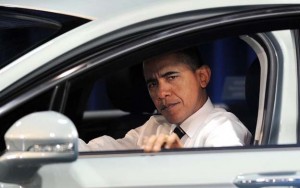There’s “no silver bullet” for bringing down fuel prices that have now topped $4 a gallon in some parts of the country, warned Pres. Barack Obama during his weekly radio address – though he insisted that the new, higher-mileage models being built by a resurgent U.S. auto industry will ultimately save consumers money at the pump.
While signs of an improving economy may be playing to the President’s advantage in recent weeks, political observers warn that fuel prices could be a critical factor in determining the outcome of the 2012 election – especially if, as some now forecast, gas hits $5 a gallon.
Obama’s GOP opponents have already picked up the cry. Before dropping out of the presidential race last year, Cong. Michelle Bachmann insisted she’d bring gas prices down to $2 a gallon if elected. Former House Speaker Newt Gingrich has made a similar claim in recent weeks – though, like Bachmann, he hasn’t discussed how.
Nonetheless, it is clear the Administration is concerned about the gas price issue – especially as it is facing the possibility that the cost of petroleum could surge if the war of words with Iran over that country’s nuclear program turns into a shooting war.
With no short-term fix, the President tried to use his weekly speech to focus on the long-term, pointing to the steady increase in the Corporate Average Fuel Economy – which is set to reach about 32 mpg in 2016 and nearly 55 mpg by 2025.
Recent studies have shown that fuel economy is already on a sharp rise. As TheDetroitBureau.com reported last month, the average vehicle sold in January reached 23.0 mpg, an all-time record. That was up nearly a mile per gallon from December, according to a study by the University of Michigan Transportation Research Institute. (Click Herefor that story.)
Doubling the current mileage of a typical vehicle, said the President, will mean “folks will be able to fill up every two weeks instead of every week, saving the typical family more than $8,000 at the pump over time.
“That’s a big deal,” he added, “especially as families are yet again feeling the pinch from rising gas prices.”
The weekend radio address – like this year’s State-of-the-Union speech – highlighted the Administration’s rescue of the U.S. auto industry and the current revival at both General Motors and Chrysler, both of which have been hiring thousands of new workers.
At the same time, the President tried to emphasize that he cannot directly control oil prices. While that is a subject likely to be much debated during campaign season oil analysts note that petroleum prices are today far more dependent than ever on global events, including the economy vitality of emerging markets like China and India. But, ironically, as the U.S. economy recovers and oil demand increases, that will likely put even more upward pressure on pump prices.
The President has, in recent weeks, been calling attention to the increase in oil and gas production in the U.S. after years of decline. And he stressed, on Saturday, that the upturn in the Motor City – which is producing more high-mileage cars than ever before – should also help.
“What’s happening in Detroit will make a difference. But it won’t solve everything,” Obama said. “There’s no silver bullet for avoiding spikes in gas prices every year.”
Nationwide, gasoline prices hit $3.74 a gallon on Friday, still well below the July 2008 record of $4.11 – but the trend remains upward, something Rep. Doc Hastings, of Washington, hammered on during the Republican radio response.
“The president, who campaigned on a promise to address rising gas prices, now talks as if they’re largely beyond his control,” Hastings said.
Perhaps surprisingly, considering the highly polarized tone in Washington, Rep. Hastings’ response signaled that both sides of the political aisle might be worried about potential fallout from fuel prices. The GOP leader noted that a meeting between Republicans and Democrats last week “provided a glimmer of new hope that the president and the Democratic-controlled Senate may finally act on some bipartisan energy bills.”
While the Democrats have called out the GOP for holding up any energy policy it seems increasingly clear that public pressure is forcing both parties to look for solutions – and fast.


Of course he doesn’t believe there is a silver bullet for this — he’s not looking for one because he is so in the thrall of “greens” that he does not get the physics. Nothing would make the far left of his party happier than for everyone to buy a pair of earth shoes and walk, regardless of the destruction to the economy. Word to the prez: if the family fills up half as often but has to pay twice as much, well, duh that won’t save anything for anyone, now will it?
If he really meant it, he would green light the pipeline, encourage domestic production, work with the EPA to approve permits for new refineries (last one built in this country was in the ’60s) and cut down on the number of pointless regional oxygenate blends that prevent the fluid (NPI) movement of fuels from one state to the next.
Keeping a lid on prices is possible, it simply takes the will to do things that may be unpopular with extremists from the left, to whom he has been pandering for the last year and a half.